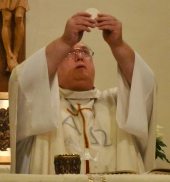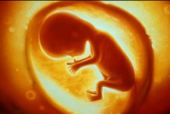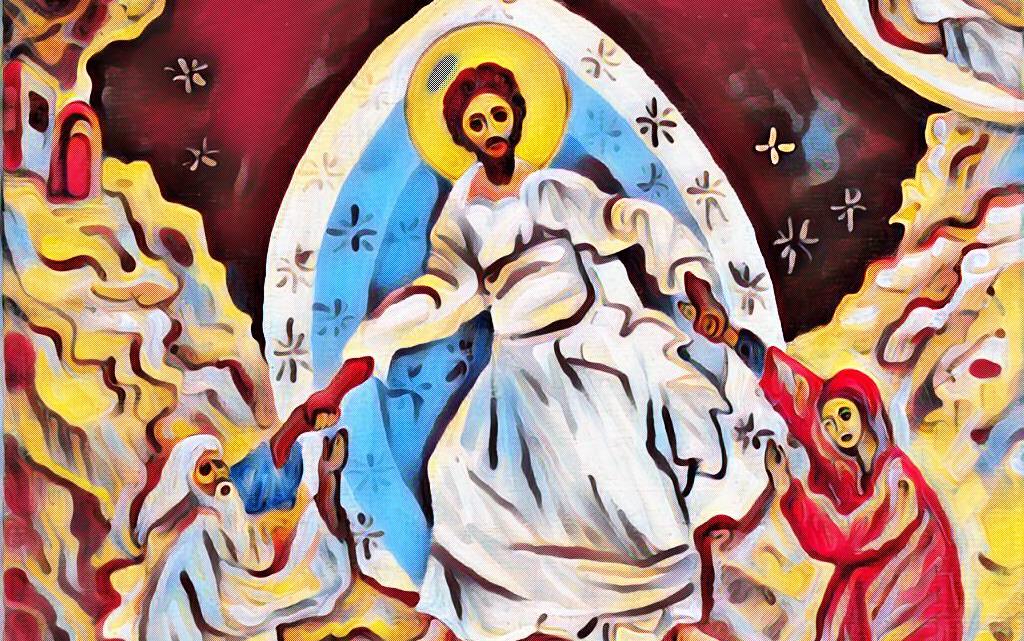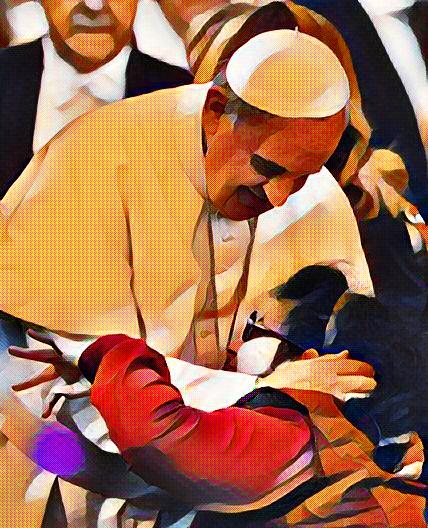Several years ago, there was a fad where people placed the logo WWJD on clothes, wristbands, and what-have-you. The letters signified the question, “What Would Jesus Do?” It was a cool idea but there was one significant problem— many fashioned a parody of Jesus and did not know him in truth. The Jesus they created was “nice” and pandered to the humanism of our times. He failed to make judgments and subscribed to popular misconceptions. The judge of all was reduced to a rubber-stamp weighed against those hard right-wing “conservative” Christians who dared to claim that God rewards obedience and punishes sin. The clichéd slogan was not alone. Another would-be sacramental for a false Christ was the plastic Jesus that adorned many car dashboards. Often, they could be found alongside a rosary hanging from the mirror, employed not as a tool for prayer but as a superstitious talisman against accident and other irate drivers.
The Jesus of the world is weak, fallible, and cowardly. The Jesus of the Bible and the Church is almighty, courageous and the truth, itself. Yes, he makes himself weak on the Cross; but he proves himself strong by overcoming the grave and the false conviction of evil men.
The argument about the strength and weakness of Christ resonates with the historical tension between his humanity and divinity. He proves himself as strong in repelling the three-fold temptation of Satan in the desert. He struggles with the human condition in the garden before his betrayal.
Then Jesus came with them to a place called Gethsemane, and he said to his disciples, “Sit here while I go over there and pray.” He took along Peter and the two sons of Zebedee, and began to feel sorrow and distress. Then he said to them, “My soul is sorrowful even to death. Remain here and keep watch with me.” He advanced a little and fell prostrate in prayer, saying, “My Father, if it is possible, let this cup pass from me; yet, not as I will, but as you will.” When he returned to his disciples he found them asleep. He said to Peter, “So you could not keep watch with me for one hour? Watch and pray that you may not undergo the test. The spirit is willing, but the flesh is weak.” Withdrawing a second time, he prayed again, “My Father, if it is not possible that this cup pass without my drinking it, your will be done!” (Matthew 26:36-42)
The prayer of Jesus was not one of despair but rather demonstrates the truth about the human condition and our Lord’s firm resolve to carry out the Father’s will. Only a sadist would desire the agony of the passion and death that Jesus would experience. Our Lord is a divine person but there is no abnormality in his humanity. The “angst” he feels is normal. Indeed, it is felt by all the great heroes. Jesus does not run away from what is coming. He faces it. Indeed, it is allowed to happen. When captured, Jesus pleads only for the release of his friends. Jesus gives all who would follow him the right to pray to be delivered from temptation and from the evil one. But his actions also reveal a deep humility in accepting the Father’s will, even when there is a part of us that wishes it could be otherwise. When Jesus tells us to take up our crosses and to follow him, he fully appreciates how difficult this might be. It is this Jesus we must know to respond as we should to our calling.
I suspect that his words in the garden reverberate with those on the Cross when he pleads that his Father might forgive us. Did he see in his mind’s eye all who would follow him as martyrs on the road to Calvary and desire in his heart of hearts that he might preserve his children from such a test and pain? Certainly, he prayed that they might have strength to endure the trial. Did he also suffer the many who would find it all too much and would turn away and abandon him? This may be the crucible where the Divine Mercy is most engaged in the lot of sinners. Ultimately, the heavenly Father does not directly desire that his Son should suffer and die; however, he does expect that his Son would be faithful to the mission given him. God is demanding but he is not a monster. It is a fact in this world that the price to save a people is the cost of a life. The value of sacrificial love makes all other loves pale by comparison.
Our Lord’s prayer is heard but he himself knew what the answer must be. There can be no tension or conflict in the trinitarian godhead. Jesus expresses in time the human turmoil that afflicts us when facing betrayal, suffering, and death. One might argue that this is his offertory to the Father before the sacrifice of the Cross.
Given the gravity of Christ’s redemptive work, we must never dismiss his role as the one mediator and savior. There is no other way to the Father except through him. It is in understanding Jesus that we come to appreciate the truth about the Gospel.
What is the Gospel NOT? It is not about a carefree toleration. It is not about being nice to each other. It is not about a libertine freedom. It is not about keeping peace at all costs. It is not about staying quiet to avoid conflict. It is not about focusing on oneself as number one. It is neither about pursuing pleasure nor avoiding pain or vice versa. It is not a political agenda or a philosophy of life. Our understanding of Christian discipleship is caught up with our appreciation of saving faith, not as a simple profession of words, but as a lifetime response to the person of Christ that is realized with love and obedience. While there is an unconditional element to divine love, it is a love that makes serious demands. There is a cost to responding to the Christ. There is no Christianity without the Cross. Obedience does not mean be true to yourself or do what you want— this is a lie that the evil one sows that we might harvest weeds against the wheat of Christ. The commandments maintain their binding force and we are obliged to offer assent, in both words and actions. We must be transformed to the likeness of Christ. The Lord must be alive and active in us. At the heart of the Christian mission is a profound humility— “Thy will be done!”
What is the goal of this saving faith in Christ? Is it a better and more utopian world? No. Is it a comfortable life where God makes all his children happy and prosperous? No. The faith is directed to the forgiveness of sins and the salvation of souls. If you end up going to hell, then your life is a failure, and you live in vain. Yes, hell is real, and Jesus is the judge of all. Some will know the reward of heavenly bliss and union with God. Others will know fire and eternal alienation from God. Ours is not the God that says everything is okay. Our Lord makes demands and disobedience will elicit the direst consequences.
The Jesus that many imagine is not the Jesus of the Bible or that of the Church. Jesus is critical with his words and actions. Look at how he addresses the Jewish leadership:
“Woe to you, scribes and Pharisees, you hypocrites!” (Matthew 23:13,15,23,25,27,29).
“Woe to you, blind guides!” (Matthew 23:16,24).
“Blind fools!” (Matthew 23:17).
“Blind Pharisee!” (Matthew 23:26).
“You are like whitewashed tombs, which appear beautiful on the outside, but inside are full of dead men’s bones and every kind of filth” (Matthew 23:27).
“You serpents, you brood of vipers, how can you flee from the judgment of Gehenna?” (Matthew 23:33).
Jesus is neither polite nor civil when it comes to the money changers in the temple:
Jesus entered the temple area and drove out all those engaged in selling and buying there. He overturned the tables of the money changers and the seats of those who were selling doves. And he said to them, “It is written: ‘My house shall be a house of prayer,’ but you are making it a den of thieves.” (Matthew 21:12-13)
We are told in John 2:15 that Jesus chased them out with a whip of cords. Any child that ever had the belt taken to him for being bad could well appreciate this scene. Jesus is not always kind or nice or gentle. He can be abrasive and filled with righteous indignation. Disobedience cries out for punishment.
Our Lord is harsh but just in his judgments. The woman at the well cannot hide her background from Jesus and the many men with whom she has been intimate. He even casts off Satan in reference to Peter who becomes a stumbling block regarding the prophecy of the passion. While many placate the whims of our society today, Jesus did not hesitate to condemn his own times as a “faithless and perverse generation” (Matthew 17;17).
We must never forget that Jesus is both the Divine Mercy and the Divine Justice. He says:
“Everyone who acknowledges me before others I will acknowledge before my heavenly Father. But whoever denies me before others, I will deny before my heavenly Father. Do not think that I have come to bring peace upon the earth. I have come to bring not peace but the sword.” (Matthew 10:32-34)
Filed under: Uncategorized | Leave a comment »





















































